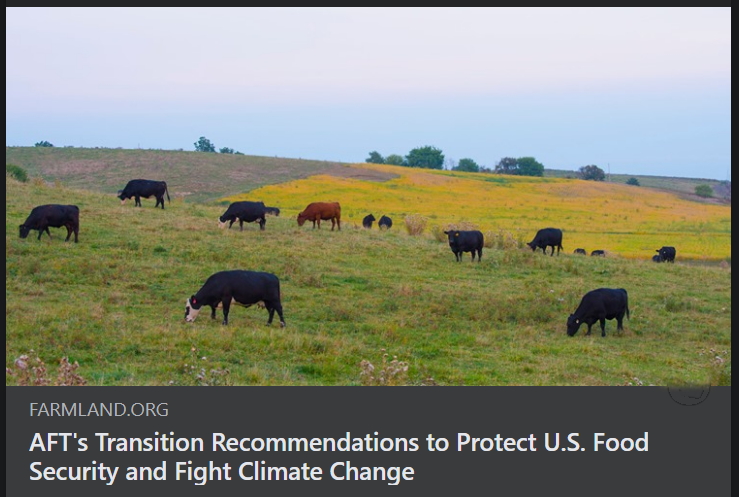 In just the 15-year period from 2001-2016, 11 million acres of agricultural land were paved over or converted to uses that threaten the future of agriculture. That's equivalent to all U.S. farmland devoted to fruit, nut, and vegetable production in 2017!
In just the 15-year period from 2001-2016, 11 million acres of agricultural land were paved over or converted to uses that threaten the future of agriculture. That's equivalent to all U.S. farmland devoted to fruit, nut, and vegetable production in 2017!
There are clear reasons to be concerned about the nation’s ability to produce food for a growing population, requiring immediate and sustained action.
Want to build a better future for agriculture? American Farmland Trust has a plan for that. Here are 5 recommendations from AFT's policy experts that Joe Biden and Kamala Harris can begin to implement on day one without congressional approval.
1) Develop a National Cover Crop Initiative
AFT recommends the creation of a USDA National Cover Crop Initiative as a means of focusing the USDA’s efforts on the goal of increasing cover crop adoption. AFT estimates that roughly tripling cover crop adoption from the current 15.4 million acres to 44.4 million acres could reduce CO2-equivalent (CO2e) emissions by 14.5 million metric tons annually. In addition, cover crops have numerous other benefits, including improving water quality and the bottom line for farmers, all while making soil more resilient to the extreme weather presented by climate change.
2) Establish the Commission on Farm Transitions
Appoint and convene the Commission on Farm Transitions within the first 100 days in office. Ensure that the findings of the Commission on Farm Transitions informs the development of the 2023 Farm Bill. The US is undergoing a seismic shift in farmland ownership that will impact American agriculture for generations to come. While the Commission should focus on the challenges facing all next-generation farmers, the Commission should place special emphasis on identifying and addressing the unique challenges facing next-generation Black, Indigenous, and People of Color (BIPOC) farmers and ranchers in their ability to inherit or purchase agricultural assets, including land.
3) Maximize the potential of the Agricultural Conservation Easement Program’s Agricultural Land Easements (ACEP-ALE)
The land vital to our country’s food security, rural economy, and climate goals continues to be lost at an alarming rate. Include a one-time investment of $1.5 billion in ACEP as part of the Biden Administration’s pandemic relief and recovery proposal to Congress. Prioritize ACEP-ALE participants for conservation technical assistance and for participation in other USDA conservation programs.
4) Strengthen the Farmland Protection Policy Act
The Farmland Protection Policy Act (FPPA), enacted in 1980, seeks to minimize the impact that Federal programs have on the unnecessary and irreversible conversion of farmland to nonagricultural uses. AFT proposes 7 recommendations to accomplish this including providing additional assistance to state and local units of government and non-profit organizations to develop plans and policies to retain and protect farmland.
5) Create a Debt for Working Lands Initiative
The COVID-19 pandemic has caused market disruptions and significant losses of income within the agricultural sector. Because of this, many producers have had to take on additional debt. As the Biden Administration considers ways to alleviate the pandemic’s economic impact, AFT encourages the expansion of the Farm Service Agency’s (FSA) Conservation Contract concept to provide additional conservation-focused debt relief and restructuring tools. An expansion of this program – in the form of a “Debt for Working Lands” Initiative – could allow producers to reduce and restructure debt in exchange for a permanent agricultural conservation easement or a shorter-term non-development covenant.
AFT’s recommendations are outlined in summary in the “Transition Recommendations for USDA” fact sheet:
The above summary contains links to detailed fact sheets on each of AFT's five policy recommendations.
Let's all roll up our sleeves and work to help these policy recommendations become reality.
Get involved locally:
Spokane Farmland Preservation Working Group
